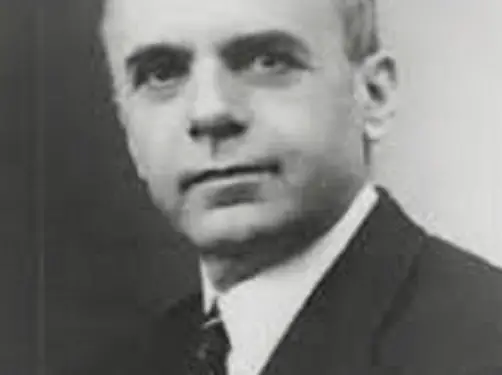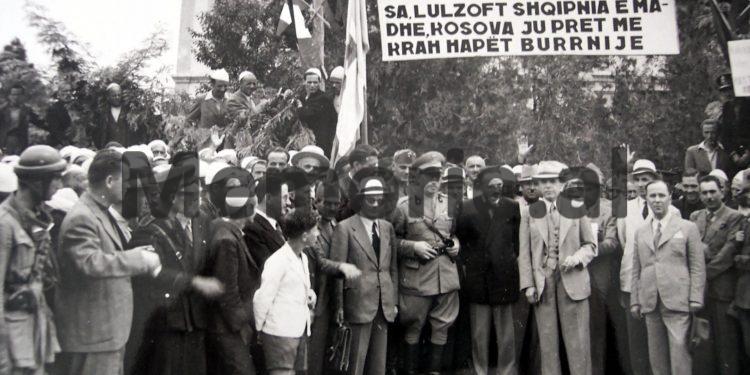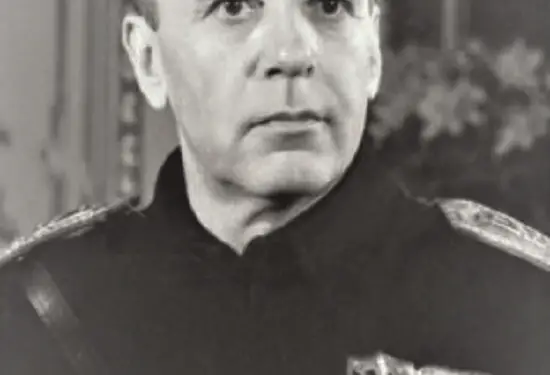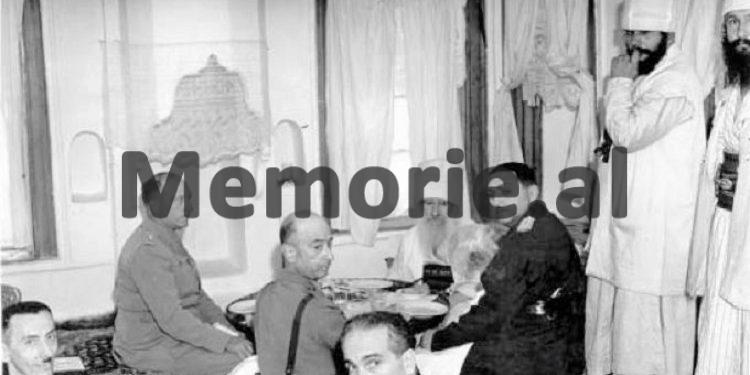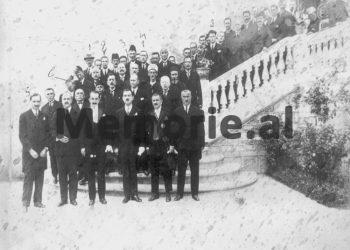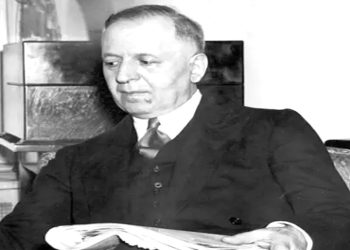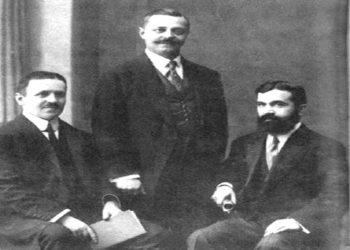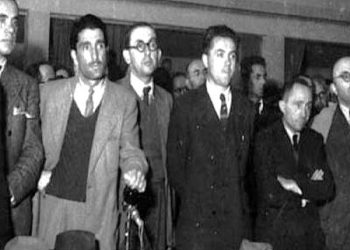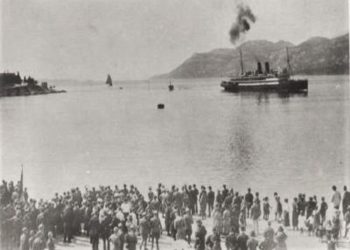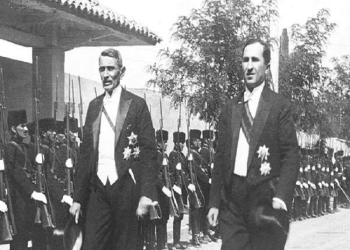From Ilo Photo
The second part
Memorie.al / Big families are named as such, because of prominent people, because of the wealth they owned and because of the influence they exercised in the social environment, at a given time. Historical turns have started from big families. Skanderbeg gathered the heads of large families in the Assembly of Lezha. Ismail Bey Vlora did the same. No union could be established without the will of large families, which were also called chimneys or gates. They had wealth, territory, and above all, they had the most knowledgeable people of the time, in a certain area.
Continues from last issue
I have written several political-agricultural books and have had to provide a historical background for each event. In this period, many specialists and agricultural scientists of the intellectual generation of the 30s of the last century were active. This was not a short transitory period, to be met with the momentary sacrifices that war in transit brings.
How would this long period and with so many privations, brought by the state of war, be coped with? In my opinion, some historians are wrong in the practical perception of this period. They talk about the period before and after the War, giving the impression that the war lasted a single night, but unfortunately, the war lasted six years.
In these years people had to work, develop the economy, trade, marry, reproduce. Was it necessary for this period to have an administrative apparatus that would foster economic life, education, culture, public order, etc.? Was it better for the Albanians that this function was performed by the invaders, with their own people? Wouldn’t it be better for Albanian citizens to find Albanian employees in the State offices, at all levels? It is the most critical point, where historians have been wrong and continue to be uncorrected. It continues to be judged with passions.
Government members, of course, should be analyzed politically and will be evaluated on how much their work has served the country. This criterion has been and remains a task of objective and non-politicized historians. There cannot be a personality that, in his work, does not have fluctuations or human errors, whether they are convictions, which are related to the “national-liberation” war, which also had elements of a civil war for the seizure of power, in the end of World War. It seems to me that the official historians, since 70 years, pass in silence almost half of the period of occupation, that there was no war, without explaining the motive.
The truth is that the communist movement, which only managed to organize itself in November 1941 under the leadership of Miladin Popović and Dušan Mugoša, until June 22 of that year, never spoke of war against the occupier, even though the country was occupied on April 7, 1939. This was because, between Germany and the Soviet Union, there was a non-aggression pact. When Hitler unilaterally broke this pact by attacking the communist state, the order from Moscow came to fight.
Albania’s interests at that time did not agree with those of international communism and its new allies. Albanian nationalism had managed to realize, thanks to the German victory in the Balkans, the national union, which was the dream of thirty years, of the independent state. The Albanian administration was extended to all “liberated lands” and Albanian schools were opened in all the Arber territories, with the exception of Chameria. From the economic point of view, Albania was the country that had felt the weight of the war less than all the other countries.
Economic and financial indicators spoke of a significant improvement in Albanian life. But with the creation of the Albanian Communist Party of the Serbian brand, all these achievements were called into question. This is where Mustafa Kruja, who until then headed the Institute of Albanian Studies, enters the scheme of power. As a far-sighted politician, he realized sooner than others the danger that threatened his country. Decided to accept the formation of the Government, which Count Ciano, in his memoirs, called; “a further concession to the extremism of Albanian nationalism”.
I like to quote here the publicist and writer Ilir Ikonomi, who in the preface of the volume, almost 700 pages long, “Half a century with a feather in his hand”, treats this very defining moment in the life of the 16th prime minister of the Albanian state:
“At the end of 1941, when Albania was occupied by fascism, Mustafa Kruja accepted the post of prime minister. We can debate all we want whether this was a mistake or a wise move at a time when there were no easy choices. But, during a little more than a year at the head of the government, he showed by his actions that, in his opinion, ideologies were only transitory things and that the homeland was a magnificent maple tree, which all shriveled under its own shadow. Merlika never became a fascist. He remained Albanian, judging by the spirit of his writings and speeches…”!
The judgment of Mr. Ikonomi is to be congratulated for his scientific objectivity, away from the taboo, ideological schemes of the historiography of the 70th communist and post-communist historiography. Kruja was characterized by permanent anti-communism. His anti-communist convictions speak of a solid culture of his, which managed to predict evil (the establishment of communism and its devastating consequences for the Albanian nation) before it happened. His philosophy was proven with the fall of the Berlin Wall 45 years later. Imagine who Mustafa Krutani was and his philosophical formation!
Again, I am leaving the floor to the researcher Ikonomi: “The year 1942 was a time of war. There was also a time when communism was beginning to be seen by some as the miracle drug that would solve the world’s ills. This red illusion was embraced by hundreds of thousands of people in Europe who either did not know or turned a blind eye to the crimes that were being committed inside the great Soviet gulag.
Therefore, it is a credit to those intellectuals in small Albania, who not only did not get infected, but tried to find ways to get ahead of the danger. “See in the castles of the Chetniks, of these palazzo idealists, the two-headed Albanian with a red crest in the middle. They have also prepared the flag of that red republic’, – said Merlika in the same speech of 1942. The prediction was correct. Even the red republic in Albania turned out to be the wildest in Eastern Europe”
The truth of the argument of Ikonomi’s analysis, I believe, needs no comment. But the framework of that analysis, I think, should be completed with a brief presentation of the main decisions of the Kruja Government. Here, according to another young researcher of the history of the Albanian governments of the independent state, Mr. Roland Qafoku, some of those decisions in the quite interesting and objective book; “History of the 33 Prime Ministers of Albania”:
“On April 23, 1942, Prime Minister Mustafa Kruja forced the Italians to remove the Lictor’s bandages from the national flag.
Decision to transfer the finances to the Ministry of National Economy. Creation of the Ministry of Free Lands, instead of the High Commissioner for Kosovo and Dibra. The union of Plava and Gucia with the Albanian lands.
Decision to rescue 300 Jewish families, providing them with Albanian documents and sheltering them in Central and Southern Albania. The operation was successfully carried out with the approval of Viceroy Jakomoni.
Decision on the return to Albania of all intellectuals who were interned.
Decision on the mobilization of soldiers born in 1920, especially for the defense of Kosovo.
Decision to send teachers and lawyers to Kosovo for the opening of Albanian schools and courts there.
Decision to help residents in the areas damaged by the earthquake, in Dibër.
Decision on removing the competences of the Italian advisers in the ministries.
Decision to abolish Italian as a compulsory language in primary schools.
Decision on death penalty, for anyone who was caught with weapons without a permit, in the strategic facilities of the state.
Decision for broad amnesty, for the members of the gangs that had fought against the Italians”!
These were some of the main activities of the Kruja government, one of the most qualitative of all Albanian governments. That generation of patriots and signers of Independence sacrificed their past, to avoid the danger that threatened the Motherland in the future. If they turned out to be lost, the price of that responsibility they took on their shoulders, which was truly tragic for them and their families, perhaps the strongest pain, was the inability of the country to understand their drama.
Today it seems that something is moving in that direction, as opinions can be openly expressed even against the official taboos of many ten-year-olds. In a television program, by researcher Qafoku, Mr. Artan Shkreli, advisor to Prime Minister Rama, answered: “If I had been there at that time, I would have been a collaborationist like Mustafa Kruja.” I am of this opinion, I believe and many others.
I am expanding the thought. Life would not stop under the conqueror, not just by instinct. Human life is regulated either by canon or by laws through institutions. This was done by the responsible intellectuals who participated in the occupation governments. They thought of a way for the continuity of Albanian life.Was her the only one? Cold logic affirms it.
The functionaries of these governments perform a governmental mission, as long as they do not exceed the political task, while the economic tasks are always peaceful. Life, continuity had to be organized. Society was not dead, it was paralyzed. He had to stand up young.
I emphasize that during the War, the state agricultural production increased, compared to the year 1939, which was the starting point of comparison, and continued to increase. Met the needs of the city and the front. Why do I highlight agricultural production? Because over 80% of the people were engaged in agriculture. At all times, agriculture has been and remains an indicator of the economy and well-being, not only Albanian.
To familiarize the reader with this problem, I am mentioning a fresh analogous fact. In the year we are starting from, which is 1990, not only has agricultural production not been achieved, but it is much smaller. This transition proved that agriculture is the most difficult sector to manage from above. In the list of Prime Ministers, presented to us by the well-known researcher R. Qafoku, agricultural production has increased under only two prime ministers: under Mustafa Krujë and under Mehmet Shehu.
Other Prime Ministers have played a role, enough to cross the bridge and hand over the weakened agriculture to the successors, increasingly incapable. Tell me a crime committed by Mustafa Kruja? There are dozens of crimes that Mehmet Shehu has committed individually. Even for this economic and social progress, Mustafa Kruja will be remembered as a statesman.The “Fulltz” farm continued to function as a model of the complex rural economy.
In the governments of the occupation, the Arbno lands functioned in the entirety of natural Albania, only without Çameria. He was not just a visionary politician, but an erudite intellectual and gifted leader. This quality of his was known by his contemporaries and friends, even the former English minister, Julian Amery, called him; “the smartest Albanian of his time”.
Among the erudite prime ministers, Fan Noli stands out, but he did not remove the cross even when he was prime minister. He claimed that democracy was among the people, when it was hidden behind the well, from where you have to save it with many sacrifices, which the Bishop had forgotten on the altar.
Mustafa Kruja knew the life of the common man, the merchant of the time, the exhausted peasant, the religious, the student, the soldier, the policeman. Did these have a protection, a god, a friend, a parent? Mustafa Kruja always thought that he was like them, from their class. He had a big heart and a horizon that covered all those he governed with sunshine.
I remembered Mustafa even when I lost my job in 1992. I was an unbranded guy waiting at the mall. The state abandoned me. Everyone could do whatever they wanted with me and my family. It took a great power, a Mustafa Krujë, who neither came nor was anywhere, to give me a solution.
Mustafa Kruja, did not even receive an imperial title, as; Spahi, Aga, or Bey. Not even any decorations from the invaders. He remained a Cretan and an Albanian, without rank and tuje. He remained a servant of the people with mind and heart. Perhaps it is worth noting Montanelli’s words, in the interview he published in the largest Italian newspaper “Corriere della Sera”, on May 21, 1942:
“I hadn’t seen Merlika-Kruja for ten years, and I noticed that she had changed very little. Success and honors have not been able to transform the nature and external behavior of this man. He is dressed more or less like he was ten years ago and he didn’t care about himself, with big pictures and words. He continues to speak discreetly, even though he now possesses perfect Italian and – a rare thing for a State man – gives the impression that what he says is true…! It was always the same man. A man!
Such a portrayal, by one of the greats of world journalism, would honor any statesman, even in the most developed country in the world. In order to preserve the continuity of this historical origin, he directed his sons and brothers, in their studies, towards professions and not towards politics. He made the eldest son, Petrit, study at the University of Grenoble, not for “talk”, but as an engineer, to serve the country in the most difficult work fronts./Memorie.al
The next issue follows




